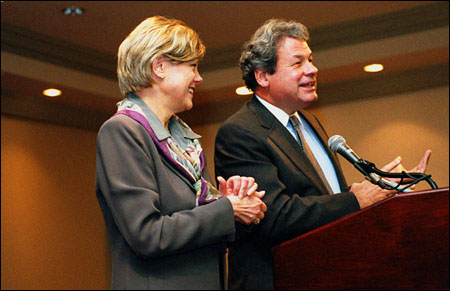SPH works to restore public’s trust in health care system:
Conference examines problems, solutions for erosion in medical trust

Thalidomide, DES (stilbsestrol), the Dalkon shield, hormone replacement therapy. The names of these high-profile medical blunders were enough to make the point. ABC News analyst Cokie Roberts in a few seconds captured a central factor in the erosion of trust in the health care system.
Doctors don’t always know what they’re talking about. And, worse, they don’t tell their patients so.
“Look at what’s happened to women of my generation, doing what the doctor told us to do,” Roberts said, adding that the recent explosion in reproductive medicine and the large numbers of women seeking fertility treatment could well set the stage for the next round of high-profile medical headlines.
“We have no notion of the long-term effect of fertility drugs. It’s another experiment that we’re participating in.” Roberts told a room full of health care professionals from across the country on Wednesday (Nov. 13). “Yesterday’s news was that women over 50 can have babies.”
Roberts and her husband, veteran journalist and professor at George Washington University Steve Roberts, were the keynote speakers at a three-day School of Public Health symposium examining the problem of the erosion of trust in the nation’s health care system.
The symposium was sponsored by the School of Public Health’s Center for Continuing Professional Education as part of an initiative to examine the problem and work toward restoring the public’s trust in health care.
Marc Roberts, symposium co-chair and SPH professor of political economy and health policy, said the symposium was designed to first examine the problem and then to search for solutions. The aim, he said, was to provide attendees with practical steps they can use at the end of the three days.
Symposium sessions covered topics that included medical errors, the increasing skepticism of patients toward the health care system, and the confusing messages on diet and the food supply. It also included discussions on how to change the doctor-patient interaction, teaching doctors to be trustworthy, and how to create a culture of medical safety.
The symposium was prompted, according to co-chair Roberts, by increasing reports from practitioners that a lack of trust was becoming a larger problem. There is a perceived backlash, he said, against the constraints of managed care and headline-grabbing medical errors.
Both anecdotal and statistical evidence backs that up, from the recent case of a Boston physician who left a patient on the operating table to go to the bank, to statistics that show that medical errors are the eighth-leading cause of death in the United States.
“I think there is not one root cause,” co-chair Roberts said. “Our goal is not to just admire problems. We’re going to have stuff people can take home next week and put into use.”
The conference, whose other co-chair was David Shore, associate dean and executive director of the Center for Continuing Professional Education, featured a range of School of Public Health experts. Included were Donald Berwick, president and chief executive officer of the Institute for Health Care Improvement and associate professor in the Department of Health Policy and Management; Robert Blendon, professor of health policy and political analysis; and Lucian Leape, adjunct professor of health policy and a recognized expert in medical safety. George Lundberg, editor in chief emeritus of Medscape and former editor of the Journal of the American Medical Association, was also featured.
During the keynote speech, Cokie Roberts drew on her own experiences – including her ongoing battle with breast cancer – to highlight what’s right and what’s wrong with a health care system.
When her sister was dying of cancer, she said, doctors were extremely reluctant to tell her sister the bad news. On the other hand, during her own fight against breast cancer, doctors at the National Institutes of Health, where she’s being treated, are candid, caring, and open to her seeking other opinions.
“I don’t expect them to cure me, that’s not where I am with this disease, but I do expect them to put my interests first,” she said. “They have been candid, they have been accountable.”
Before Cokie Roberts spoke, her husband, Steve Roberts, who is the brother of symposium co-chair Marc Roberts, said trust in the medical profession is dependent on the same things as trust in business, in journalism, and in other parts of life.
It’s not infallibility, however. It is the willingness to admit when one’s wrong and the willingness to be accountable and make amends for any error. Admired politicians have a reputation for speaking straight. Institutions that have taken nosedives in public opinion, such as the Catholic Church struggling through the recent priest sex abuse scandal, have been seen as trying to cover up.
“Trust is an investment that produces trust in turn in those we serve,” he said.




